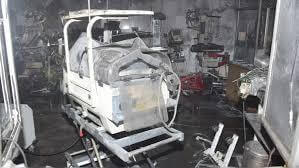A devastating fire in the neonatal intensive care unit (NICU) of Jhansi’s Maharani Lakshmi Bai Medical College, which resulted in the tragic deaths of 12 newborns, could have been prevented if the hospital had acted on the findings of an electricity safety audit conducted five months earlier. The fire, believed to have been caused by a short-circuit, exposed serious lapses in the hospital’s electrical infrastructure, many of which were highlighted in the audit report, obtained by HT.
The audit, conducted as part of a statewide safety initiative after a fire at SGPGI in Lucknow, identified numerous hazards at the Jhansi hospital, including exposed wiring with joints, inadequate earthing, missing miniature circuit breakers (MCBs), a lack of firefighting systems, and electrical circuits not matching the power load requirements.
GK Singh, the director of electricity safety, stated that the audit had flagged these serious issues and sent recommendations to the medical college administration, but no compliance report was received. “We expected the hospital to take corrective action, but nothing was done,” he said.
The safety audit, conducted on June 17-18, 2024, by a two-member team from the Jhansi electricity safety office, uncovered critical faults across various hospital departments, including the administrative building, auditorium, and pathology units. Exposed wiring and faulty connections, including improperly secured aluminum wiring, were found throughout the facility.
The report also noted a dangerously low overhead LT line, which was only two meters above the gynecology department’s tin shade, whereas regulations require a clearance of at least 15 meters from the ground. Emergency electrical systems were inadequate, and essential safety features, such as earthing and cooling systems for electrical panels, were missing or malfunctioning.
Additionally, the audit revealed that basic precautions, such as securing live wires and replacing damaged components, had not been taken. Critical panels in the emergency system were found damaged, and the main power distribution board (PDB) was not properly earthed, posing a high risk of electrical fires.
As reported by hindustantimes, the audit also noted the absence of firefighting equipment, such as fire extinguishers and smoke alarms, across many hospital units. “What’s most concerning is that even MCBs and MCCBs, which protect circuits from damage caused by excess current, were missing from most areas,” Singh explained.
Chandra Bhushan Chaubey, who conducted the audit, confirmed that a follow-up inspection in January 2024 had identified the same issues, yet nothing had been done to address them by June.
A preliminary inquiry by the Jhansi commissioner has pointed to a short-circuit as the likely cause of the fire, with the final report expected later this week from a multi-department investigation. The hospital management has not yet commented on the situation despite several attempts to reach them.
























